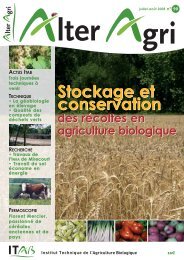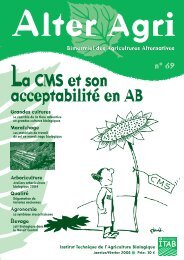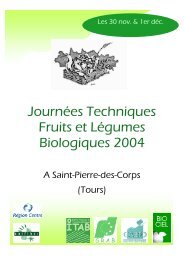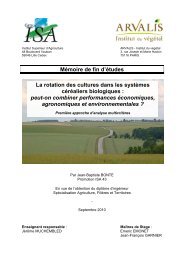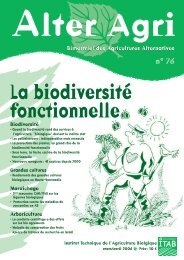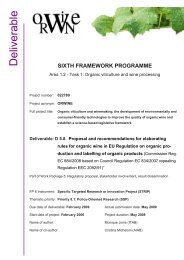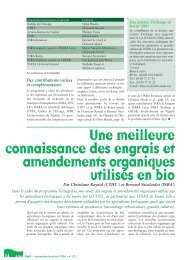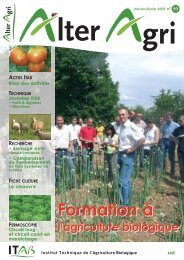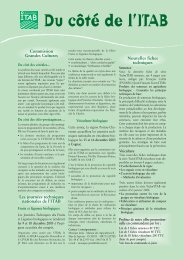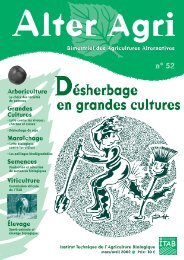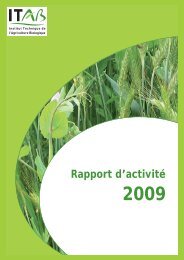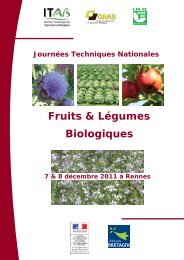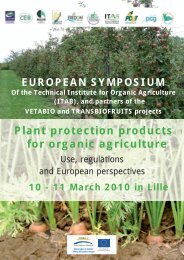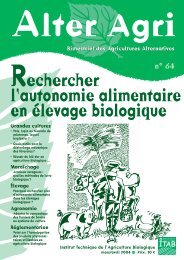Elevage Biologique - Itab
Elevage Biologique - Itab
Elevage Biologique - Itab
You also want an ePaper? Increase the reach of your titles
YUMPU automatically turns print PDFs into web optimized ePapers that Google loves.
Network Eco-AI (Bio-KI)<br />
W.J. Nauta<br />
Louis Bolk Institute<br />
The Netherlands<br />
www.louisbolk.nl / w.nauta@louisbolk.nl<br />
Introduction<br />
The network Eco-AI is an initiative of 10 organic dairy farmers who are interested in cattle breeding. The network is financed by EU funding for the<br />
development of rural areas and supervised by the Louis Bolk Institute.<br />
Organic farmers are still very much depending on conventional breeding companies and their bull supply. However such bulls are selected for the<br />
high input conventional farms and often ‘made’ by super ovulation, IVF and embryo transfer (ET). These type of animals and the breeding systems<br />
are not in line with the intensions of organic farming. That is the reason that this group of farmers will set up a breeding program within the organic<br />
sector by selecting bulls from the best bull mothers from organic dairy farms and breeding without ET.<br />
Goal<br />
• Developing an effective and affordable organic breeding program based on the best animals of organic farms and<br />
without the use of modern reproduction technologies.<br />
Breeding program: “YOUNG BULL” SYSTEM<br />
Since organic farming is still small, we have about 25.000 female animals at 320 farms in The Netherlands, a commonly used test-system is to<br />
expensive and will lead to inbreeding. Therefore we try to set up an ‘young bull’ system. This system was developed for the Guernsey breed by Dr M.<br />
Bichard and Dr. J. Woolliams (Roslin Inst. UK). They select each year 15-20 young bulls from the best mothers and use these bulls one year for<br />
breeding. The bulls are used evenly over the population while taking care of inbreeding. After collecting semen, the bulls are slaughtered or sold for<br />
natural breeding. In this way they always use in average the best genetics for the next generation with a short generation interval.<br />
For the organic Eco-AI breeding plan, we select bulls from cows that realized a high life performance of milk production and outstanding<br />
performance in the herd.<br />
Breeding goal:<br />
• High life production<br />
• High protein percentage (> 3.3% protein)<br />
• High fertility, good udder health, good conformation and functionality<br />
• Good condition score, good calving ease.<br />
Structure: “by the farmers, for the farmers”<br />
• Breeding commission selects best bull mothers and bulls.<br />
• Farmers/Breeders send the bull for semen collection to a EU certified AI station for the collection of 1000-3000 straws (costs are 2500-<br />
3500€ including blood tests and photo of the bull).<br />
• Eco-AI coordinates and stimulates the marketing of the bulls.<br />
• Price per straw is €8-10. Owner of the bull will become €5/straw of the first 500 straws sold. Eco-AI and AI station are paid €2,50 per<br />
straw each.<br />
First results:<br />
In November 2009 the first Eco-AI bull Bio-Opneij-Wytze P was put on the market. It is a red Holstein bull<br />
that is polled . His Father is Lawn Boy, a bull with outstanding durability. The mother and mothers-mother<br />
produced together about 70.000 kg milk. The mother is a daughter of Kian x Stadel and has very high<br />
percentages of milk fat (5%) and protein (4%).<br />
Up to now 720 dosis of semen from Opneij-Wytze are sold to organic and also some conventional farms.<br />
In October 2010 we will put 3 more bulls on the market. A 100% HF bull, a 50%HFx50%White headed bull<br />
and a 100% Dutch Friesian bull. All from mothers that produced already 57, 85 and 90 tons of milk with<br />
3,35, 3,53 and 3,58% protein in the milk.<br />
In December 2 more bulls will follow, A 100% Brown Swiss (JunkerxJubilent) and 100% Red HF (Kian x<br />
Stadel)<br />
In 2010 we try to select again 7-10 bulls. In total we will grow to about 20 bulls per year.<br />
Possible markets are also Belgium and Germany. In this countries we will also try to select bulls.<br />
Eu funding for development of rural areas.



